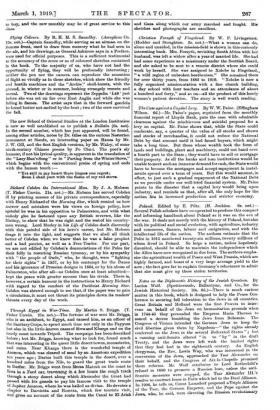The Case against a Capital Levy. By W .W W.
Paine. (Effingham Wilson. 6d.)—Mr. Pain's paper, reprinted from the monthly financial report of Lloyds Bank, puts the ease with admirable clearness against the mischievous and suleidal proposal for a levy on capital. Mr. Paine shows that, while the State could confiscate, say, a quarter of the value of all stocks and shares and stocks of merchandise, it could not reduce the National Debt by that amount until it had found buyers, which might take a long time. But those whose wealth took the form of lands and buildings, plant and machinery, could not hand over
• fourth part to the State ; they would have to sell or mortgage their property. As all the banks and loan institutions would be unable to meet such an immense demand for cash, the State would have to become the mortgagee and accept repayment in instal- ments spread over a term of years. But this would amount, in effect, to just such a gradual repayment of the National Debt as we provide under our well-tried financial system. Mr.Paine points to the disaster that a capital levy would bring upon industry, and reminds us that, after all, the only hope for the nation lies in increased production and stricter economy.


































 Previous page
Previous page